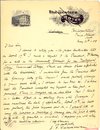“…other educational agencies:” - Affiliated Colleges
On 13 November 1907, the University Senate requested Council gather data and report on the matter of affiliation of other colleges and institutions with the University of Saskatchewan. The Senate received recommendations the following May. Walter Murray explained the resulting system in his fourth President’s Report:
“The University has entered into affiliations with other educational agencies. With the Department of Education it has co-operated in unifying the courses for teachers and the courses for Matriculation in the Provincial High Schools and Collegiates. Further it recognizes Teachers' Certificates for Matriculation and the Department in turn gives recognition to work done in the University for Teachers' Certificates. The Normal Schools are also in affiliation and there is co-operation between them and the University.

16 March 1914, looking toward the city. Some of the original Emmanuel buildings – fondly referred to as the “shacks,” along with the permanent stone building.
Affiliations with Theological Colleges have also been established. Sites on the University Campus have been granted to three Colleges, Emmanuel, the Presbyterian and the Methodist. Other sites are available. St. Chad's College, Regina, has been admitted to affiliation.
The High Schools, Collegiates, and the Colleges in the province doing preparatory work are recognized and in a sense affiliated. Each has the right to nominate each year a pupil to a scholarship giving free tuition in the University.
With the Professional Societies the establishment of relations of affiliation has been slow. These relations involve the examination and certification of candidates for the license to practice. So far as the teaching profession is concerned this work is done by the Provincial Department of Education. For the Ministry the churches will always hold and exercise their rights. For the older professions of Law and Medicine, their elected Councils have exercised this right, with the consent of the Legislature. There is a growing demand that the state should intervene and exercise over the licensing of candidates for all the professions (with the exception of that of Divinity) that control which for years it has exercised over teaching. The Province of Alberta has transferred to the Provincial University the duties of examining candidates for licenses in Medicine, Law, Dentistry, Surveying, Accounting, Architecture, Pharmacy and Veterinary Science. In Saskatchewan the professions of Accounting, Architecture, Pharmacy and Veterinary Medicine have voluntarily transferred these duties to the University, and negotiations with other societies are in progress.
The general principle of these affiliations makes the University responsible for the examining of the candidates but grants due recognition to the Society in the constitution of the Examining Board, and leaves to the Society the issuing of the licenses in accordance with the report of the Examining Board.”

